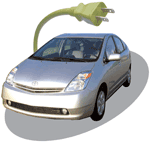Consumers Still Unsure About Electric Vehicles, According to Cars.com Survey
 |
SEE ALSO: Electric Vehicles Solution or Diversion?
SEE ALSO: Clean Diesel Tutorial (Published 2004)
SEE ALSO: EV-MOTORING.COM
Even More Consumers are Unsure of Clean Diesel Cars
CHICAGO, May 4, 2010; With the Chevy Volt and Nissan Leaf set to hit dealer lots, 40 percent of consumers still feel they don't know enough about the technology to consider an electric vehicle for their next purchase. While the bulk of consumers are still unsure of the technology, those who said they would consider an electric vehicle (36 percent) for their next car purchase outweighed those who said they would not (24 percent).
"Electric cars still face many hurdles in the minds of consumers who have range anxiety," said Cars.com Editor and Chief, Patrick Olsen. "When asked for reasons they would not purchase an electric car, 54 percent said they feared they would run out of electricity while out on the road, while 43 percent said they drive distances greater than electric technology will currently allow."
The cost, infrastructure and time needed to charge an electric vehicle are also concerns for many consumers. 36 percent said they don't have or don't want to pay for an electric outlet in their garage for charging an electric vehicle. They also have high expectations on an acceptable amount of time for a vehicle to fully recharge, with 41% of consumers indicating it should take less than 2 hours. While there was a wide discrepancy among consumers when it comes to the amount of miles per charge that was considered acceptable, roughly a quarter of all consumers said they would expect more than the 400 miles per charge.
Age and gender play a role in whether or not a consumer would consider an electric car. Men are almost twice as likely as women to consider the new technology and 60 percent of consumers age 18-24 said they would consider an electric car, while only 25 percent of consumers age 45 to 54 said they would consider one.
Survey respondents were also asked for their thoughts on clean diesel technology. 54 percent of consumers said they don't know enough about clean diesel to consider it for their next car purchase. Cost of diesel fuel was the primary deterrent to consideration, with 59% citing the expense of fuel as a reason not to buy.
"It's interesting to note that more consumers say they have heard of electric cars than have heard of clean diesel cars, which have been around much longer," said Olsen. "Despite a growing number of eco-conscious consumers and interest in saving money at the pump, both of these alternatives have a ways to go to gain mass consumer awareness, appeal and acceptance. That said, we are thrilled to see more options being developed."
This survey was conducted online by Impulse Research on behalf of Cars.com with a random sample of 1030 men and women, 18 and older. The sample has been carefully selected to closely match US population demographics and the respondents are representative of American men and women 18 and older. The overall sampling error rate for this survey is +/-3 percent at the 95 percent level of confidence
About Cars.com
Cars.com is the leading destination for online car shoppers, offering credible, easy-to-understand information from consumers and experts to help buyers formulate opinions on what to buy, where to buy and how much to pay for a car. With comprehensive pricing information, side-by-side comparison tools, photo galleries, videos, unbiased editorial content and a large selection of new- and used-car inventory, Cars.com puts millions of car buyers in control of their shopping process with the information they need to make confident buying decisions.
Launched in June 1998, Cars.com is a division of Classified Ventures, LLC, which is owned by leading media companies, including Belo , Gannett Co., Inc. , The McClatchy Company , Tribune Company and The Washington Post Company .


